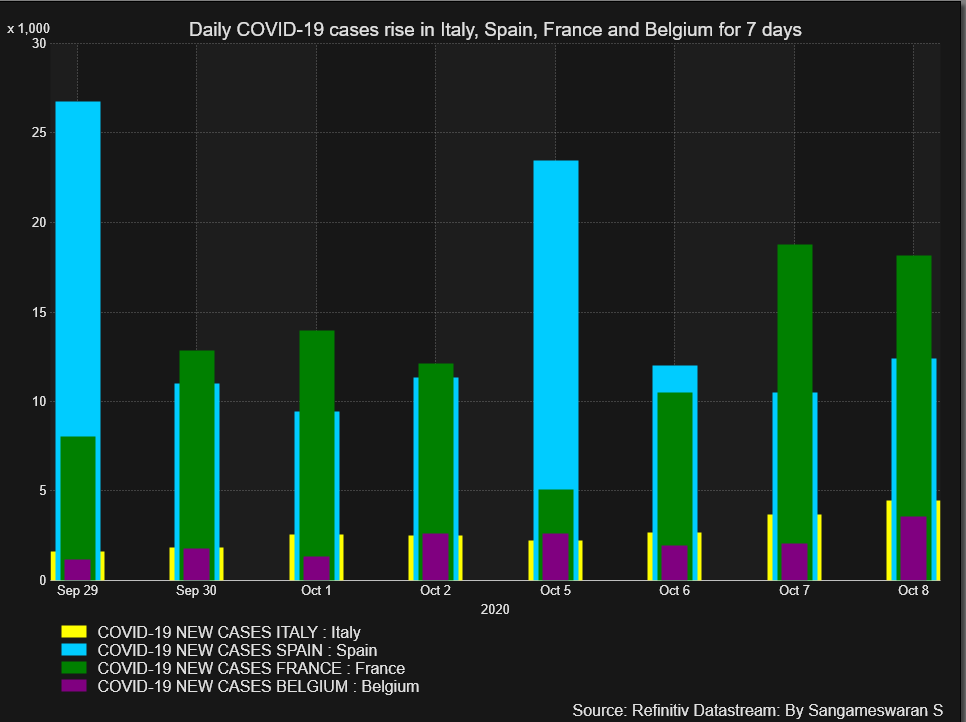Europe's Rising COVID Cases
"[...Trying to take a balanced approach between the extremes of] shuttering our lives and our economy [and abandoning the fight against COVID-19].""We don't want to go back to another national lockdown. [But] we can't let the virus rip."British Prime Minister Boris Johnson"[In Britain and other European countries] a full lockdown is off the political agenda [partially because of the] fear factor [surrounding the virus not being what it was in the spring].""It's clear that people can't endure long-term restrictions outside of authoritarian regimes."Ravi Gupta, microbiologist, University of Cambridge, U.K."If over the next two weeks we see the indicators worsen, if intensive care beds fill up even more than we expect, we will indeed take additional measures."French Prime Minister Jean Castex

New COVID cases have quadrupled in the past three weeks in Britain, where more COVID-19 patients have been hospitalized than before the government-imposed lockdown of March. The situation is a guarantee for a fresh package of restrictions certain to enrage Brits fed up with life-constraining regulations. Targeted local restrictions are the order of the day; closing pubs in Liverpool for example, hoping to avoid another national lockdown.
Prime Minister Boris Johnson advised his direction is in favour of a balanced approach, announcing a three-tier alert system where areas of highest concern -- Liverpool now included -- ensures that pubs and bars be closed, and household mixing banned. Those areas falling into the middle tier restricts people from meeting indoors with others not part of their household, while the lowest tier must abide by measures in place, with pubs set to close at 10 p.m. and gatherings limited to six people.
Across Europe, countries look for compromises, scrambling in desperation hoping to contain a resurgence of the SARS-CoV-2 virus that has already decimated most economies and demoralized their populations. A sharp rise in infections and hospital admissions has introduced the return to a previous time not that long ago when life was a shambles and death on the near horizon. Businesses in desperate straits express frustration and rage, and individuals are resisting well beyond how they did in the spring.
 |
| Medical staff hold swabs for rapid COVID-19 tests at a high school in Rome, Sept. 28. (Cecilia Fabiano/AP/CNN) |
Full lockdowns are more successful in avoiding transmissions and death, but it is abundantly clear to governments that their populations won't stand for them. After a leap in cases and hospitalization rates, France is moving toward further restrictions in view of authorities having reported 27,000 new cases on Saturday, in the previous 24 hours, a decidedly unwelcome record. Health officials on Monday stated that numbers hospitalized had surpassed 8,600 for the first time since late June. People are being urged to limit gatherings in homes.
Spain's Prime Minister Pedro Sanchez brought forward emergency powers preventing travel in and out of Madrid, in essence overruling the local government. During Spain's National Day celebrations on Monday people gathered outside the Royal Palace to heckle Sanchez's government while the far-right Vox party led a vehicle procession protest against "the criminal and totalitarian government". Over 20,000 new coronavirus cases over the past seven days was reported in the Madrid region; one of the worst-hit areas in Europe's second wave.
Diagnosed cases last week in Belgium were 89 percent higher than the previous week. Yves Van Laethm, spokesman for the national coronavirus response, warned that if current trends cannot be stemmed, the number of COVID-19 patients in intensive care units at October's end could rival heights seen in March and April. "All indicators continue to increase alarmingly", he reported.
Munich was added to a growing list of coronavirus "red" zones in Germany, triggering new restrictions. Munich's bars and restaurants will be required to put a stop to serving alcohol past 10 p.m., mask-wearing is to be mandatory for pedestrians, and no more than two households or up to five people are permitted to meet in groups. Outdoor events are capped at 50, and private indoor events at 25 attendees, for the next two weeks at least.
Italy's trajectory is worrying, despite that the number of daily cases has not yet reached numbers seen in other Western European countries. The new outbreak is reaching into southern regions with frailer economies and hospital systems, unlike earlier when mostly the country's wealthier north was struck. A nationwide mandate was issued that masks be worn indoors and out, in the face of new COVID cases topping 5,000 in a single day for the first time since March.

Labels: Europe, Global Pandemic, Rising Case Numbers

<< Home